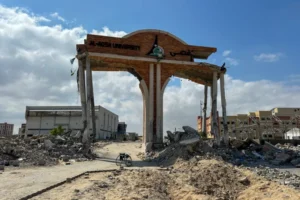If the Gaza war doesn’t shock Israeli academics, maybe boycotts will

The damaged gate of Al Aqsa University which was destroyed by the Israeli army, stands in Khan Younis in the southern Gaza Strip, 14 April 2024
Hanin Majadli writes in Haaretz on 3 July 2025:
The International Sociological Association announced this week that it was suspending the Israeli Sociological Society from its membership. This is a dramatic, precedent-setting step for Israelis, but it isn’t surprising. Indeed, it’s an essential action for normative people who don’t want what Israel is doing in Gaza to become normalized.
This is just one of several steps that have targeted Israeli academia in recent years. Papers have been rejected, requests for letters of recommendation have been denied, invitations to conferences have been withheld and, most notably, there have been institutional boycotts.
The Israeli response immediately focused on both the damage and a sense of victimhood. This will actually hurt Israelis who oppose the government, and the possibility of researchers participating in conferences, applying for international grants and publishing articles. A pity, but perhaps they should reflect on the larger context.
Tens of thousands have been killed in Gaza, and thousands more are missing beneath the rubble. That’s the only thing that matters right now. As the ISA said, the suspension was due to the Israeli organization’s refusal to condemn the genocide in Gaza, the destruction of universities, the killing of academics and the torching of Gaza’s main library.
You want to not be boycotted? You’re outraged by the academic ostracism? It’s worth recalling that even before October 7, 2023, Israeli academia was already a natural candidate for boycotting. Academic institutions and academics from an occupying country violating international law should have long since been ostracized and boycotted.
And they should, at least once, have condemned the army, which destroys institutions of higher education. They should also have denounced academic institutions that grant benefits and exemptions to reservists involved in war crimes.
You find that difficult? Perhaps because they’re your children, your students, your colleagues. Or because it’s no longer just about academia – but about your home.
Nor should we forget the universities’ special programs for officers in the army and the Shin Bet security service. They too are spouses, friends, research partners. And that includes research that develops weapons used in Gaza, the West Bank, Syria and Lebanon. It’s a tool of destruction cloaked in academic robes.
Israeli sociologists’ responses included regret, sorrow and even condemnations – not for the destruction of Gaza, but for the suspension itself. Judging by a post from one of Israel’s leading sociologists and the responses to it, the mood is clear: We have no interest in joining a club that refuses to accept us as members, especially not a club in which membership has become a badge of shame.
There was also concern over the fact that many more boycotts will target Israeli academics who oppose Prime Minister Benjamin Netanyahu’s government.
bThe academic boycott isn’t an emotional response or a woke practice by bleeding-heart radicals who don’t understand the “complexity” – a complexity that only Israelis seem to see. The boycott is part of an old, respected and rational political worldview where civil society fights against institutions that create or sustain oppression.
Boycotts aren’t always effective, and especially not when they remain within the bounds of an academic conversation. But often, and this is clearly so with regard to the Palestinian issue, they are effective and can gain momentum. That’s especially true when they lead to broader boycotts – economic, military and diplomatic.
Above all, boycotts are effective because they shock people. If the destruction of Gaza doesn’t shock you, perhaps this boycott will.
This article is reproduced in its entirety
